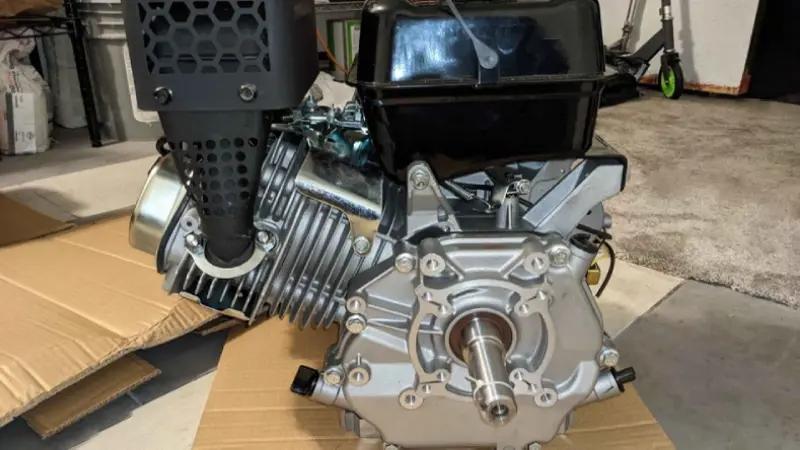Engine knocking in go-karts can be quite rare, but they do occur from time to time. When the ignition in your engine causes an interrupted, delayed or improper combustion, the cylinder does not start off and run correctly. This can cause a knocking sound in the engine that is similar to a tapping or pinging noise.
Go-kart engine knocking can occur in both two-stroke and four-stroke engines and you should try and fix this immediately, as it can not only affect fuel consumption, but may possibly damage the internal components of your go-kart engine.
Here are a few steps that you can take to fix the engine knocking problem on your go-kart:
You may follow the above steps in sequence, as they are ordered from easy to hard fixes. Each step is detailed below and explains how to fix the knocking sound on your go-kart engine. If you require more help, it’s best to check with a mechanic.
1. Use Higher Octane Fuel
It’s important to use a fuel that has an appropriate octane rating. The amount of octane in fuel determines at what pressure level the fuel combusts inside the go-kart engine. The higher the octane rating in fuel, the longer it has the ability to withstand premature combustion.
As engine knocking occurs through premature combustion, often a fuel with a higher octane rating will solve this problem. The more important question to answer is how you can actually get your hands on high octane fuel and how high the rating should be.
Most petrol stations offer two to three different grades of fuel. The rating itself can be identified via the RON (for Europe & Asia) or the AKI (for USA) number.
| Fuel Type | RON Rating | AKI Rating |
|---|---|---|
| Regular Grade | 94 - 95 | 83 - 84 |
| Higher Grade | 96 - 97 | 85-87 |
| Premium | 98 - 100 | 88 - 90 |
Typically, the manufacturer of your go-kart or engine will include the recommended octane rating in the owner’s manual. However, as a general reference you should be using an octane rating of at least around RON 97 – 100 or AKI 87 – 90.
Also note that anything below this may cause go-kart engine knocking and is not recommended. Some people also put ethanol into the fuel, which is not advised. Instead you could opt for an ethanol-free octane booster. This allows for higher compression ratios by raising the octane rating.
2. Use Correct Spark Plugs
The spark plug is located above the cylinder head and provides the spark which ignites the air/fuel mixture. If your spark plugs are faulty they may not be able to ignite all the fuel that is required for a proper combustion cycle. This can also happen with an incorrect spark plug gap.
Therefore, ensure that your spark plug is screwed in correctly and that it’s not faulty. It’s best to change your spark plugs regularly and to include this activity in your maintenance schedule. You’ll also need a high quality go-kart spark plug that is suitable for your engine size.
In summary, ensure that you have the right spark plug and that it’s correctly and securely screwed in.
3. Ensure Correct Fuel-Air Mixture
The efficiency of the combustion that happens inside your go-kart engine depends on the correct air-fuel mixture. Your go-kart should have an air filter that is connected to an intake manifold which is attached to the engine. The air filter provides your engine with the required amounts of air and mixes with the fuel to combust.
Having clogged air filters may cause the mixture to be too fuel-rich, which could cause engine knocking. Therefore, ensure that enough air enters the cylinder. Alternatively, your carburetor may not be calibrated correctly. If that’s the case, then you’ll need to adjust the carburetor on your go-kart.
If you have a carburetor that mixes the proper air-fuel ratio, ensure that the jets are not clogged and the valves are functioning properly. Also make sure to clean your carburetor from time to time to avoid engine knocking.
4. Remove Carbon Buildup
As mentioned, a premature combustion can lead to engine knocking. One reason this could be happening is because of the carbon build up in your go-kart engine. Carbon is a residue of the engine’s combustion process and builds up as the fuel/air mixture burns.
This may lead to engine knocking through two things that occur. Firstly, it can increase the pressure inside the cylinder causing the combustion process to occur prematurely. Secondly, the carbon build up can cause your fuel to ignite before it’s actually supposed to.
If you are experiencing engine knocking due to carbon build up in the engine, you’ll need to remove the carbon. Untreated engine knocks can eventually lead to engine failure.
Take note that removing carbon from your engine requires you to open it up and clean the cylinder and piston. This requires some form of knowledge on how two-stroke or four-stroke engines work and should only be attempted if you’re equipped with that knowledge.
However, you can seek help from any mechanic, as they will be able to clean the carbon inside of your go-kart engine. I would recommend only investigating possible carbon build up if you have tried all other steps listed above (higher octane fuel, spark plugs and fuel/air mixture check).

